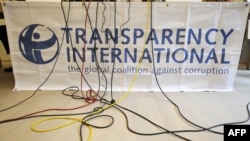Global efforts to curb public sector corruption are stalling, even reversing in some regions due to armed conflicts and dysfunctional justice systems, a leading corruption watchdog said on Tuesday.
Berlin-based Transparency International’s annual report paints a grim picture, revealing that most countries have made negligible or no progress in tackling corruption.
“Both authoritarian regimes and democratic leaders undermining justice contribute to increasing impunity for corruption and, in some cases, even encourage it by removing consequences for wrongdoers,” the company said in a statement.
Even while it repels the Russian invasion, Ukraine has made steady progress in reducing corruption by reforming the justice system and enhancing its anti-corruption body, Transparency International says.
In 2021, Ukraine was ranked 122 among 180 countries in the organization’s Corruption Perceptions Index. In 2022, it moved up to 116, and to 104 in 2023.
Nevertheless, the report says, the war created fertile ground for corruption, creating the risk of unraveling hard-fought gains in transparency and accountability across the globe.
Since Russia's invasion of Ukraine in February 2022, the United States and its Western allies have poured over $100 billion in military, humanitarian and financial assistance into Ukraine, according to data from the Kiel Institute.
Armed conflicts in several Middle Eastern countries also pose formidable challenges to anti-corruption efforts.
“Recent reports show emerging corruption practices, such as the payment of ‘fees’ on the border for those fleeing the war. Not only does this have serious impacts on the most vulnerable, but it adds another layer of injustice and reinforces power imbalances,” Transparency International spokesperson Marko Kovacevic told VOA in an email.
Least, most corrupt
For the sixth year, Denmark is considered the least-corrupt state in the world, according to Transparency International. Joining it at the top of the index are Finland and New Zealand, with Norway and Singapore close behind.
High levels of prosperity, education and open governance are considered key drivers of European success in combating corruption.
Somalia remains in the lowest position for the second year in a row. Joining it at the bottom of the index are Venezuela, Syria and South Sudan, highlighting persistent public sector corruption challenges in these countries.
While Europe is traditionally reported as the least-corrupt continent, some cracks may be appearing in its anti-corruption ranking. Several European countries, including Sweden, the Netherlands and the United Kingdom, have seen their rankings slip for the second consecutive year.
The United States ranked 24th on the index for the second consecutive year.
China, the world’s second-largest economy and the second-most populous country, experienced a significant drop in its ranking, plummeting from 65 to 76 in one year.
Under the Taliban, Afghanistan has reportedly seen a marked return to corruption, with its ranking slipping from 150 in 2022 to 162 in 2023.










